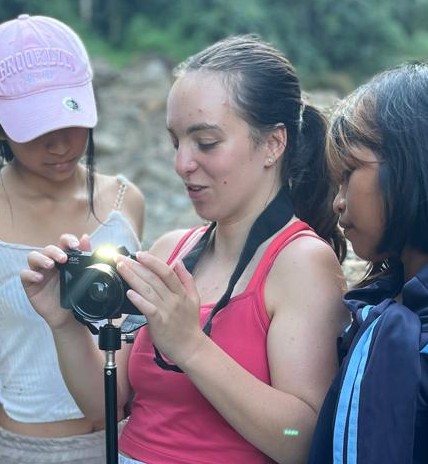In Maxy's Hands
- Maya Laur

- Nov 7, 2025
- 3 min read
Updated: Nov 7, 2025
By Maya Laur
Rehearsing Change student from Brown University
Spring 2025

Maxy stands at the edge of his chakra, smile crinkling at the corners of his eyes, banana leaves laid out behind him, bearing mounds of chopped sugar cane.
In English, chakra is Kichwa for “food garden,” but really, it translates to so much more. It is a framework for agricultural harmony — a coexistence between plant and soil, an ancestral food forest rooted in knowledge passed down through centuries.
And today, we’re here to learn from its wisdom.
The sandflies flit through afternoon sunlight as local restorers, community educators, Children of the Living Forest students, and international undergrads stand in a circle, asking permission to enter the forest. Maxy has been cultivating this land for 35 years, he says. And he has the trees to prove it: banana stalks stretching high into the sky, lemons hanging plump from crooked branches, cinnamon leaves wafting sweet aroma into the balmy air.
The forest, it’s clear, has a lot to say — and there is memory in the soil, and knowing in Maxy's hands.

Replanting the Past
Back in the days of Texaco (when even this part of the Amazon was treated as the open frontier for extracting natural resources), this land was a naranjilla farm, used to harvest wood and citrus for a market that thrived on monoculture and mass production.
But then, Maxy saw how industrialized agriculture was hurting the soil — and the people who tilled it. So he set out to cultivate a new relationship with the land, one that allowed his friends and family to make a living free of exploitation and lingering coloniality; one that returned to the practices of their ancestors; one that would sustain his great-great-grandchildren.
And so, in 2020, with the help of the Humans for Abundance restoration project, Maxy tilled over the lumber yard and planted a forest where once upon a time there was only a farm. Now, the land has grown with him — each insect and flower hanging in balance, each berry and seed a perfect symbiosis.

Wisdom in the Forest
The banana fronds, Maxy tells us, provide shade for the coffee and cocoa plants. The lemon beebrush in the forest wards off crickets. The ice cream bean trees fertilize the whole chakra.
Maxy shows us the limes used for soup and coughs, the paso trees that grow at varied heights to protect each other from sun and soil damage, the guayusa leaves that community members drink in a tea each morning as they sit around the fire and tell of last night’s dreams.
We walk by a tree whose bark serves as a COVID remedy, a fern that kids take as Tylenol, and an herb for snake bites that would have been lost forever if not for Maxy.
We eat cacao fruit and rub achiote on our faces. Clider, 8, traces swirls on the big kids’ cheeks. Nilo, a senior, hauls it up a tree to pick fresh guaba.

Offering the Hands
We emerge from the trees carrying plantain leaves overhead as rain sprinkles like drops of gold. With flowers, fruits, and seeds in hand, we return to the circle and form a chakana — an Andean compass bridging the human world to the cosmos, as many describe it.
One student adds a stone to the compass that reminds her of her grandmother. Another, a guaba seed to save for her grandkids.
“I want to offer the hands of Maxy,” Suzanna’s voice sounds from the far end of the circle.
She is a community leader from the Andes who dreams that one day her children will speak Kichwa, just like her great-grandmother did. She takes his palms and places them on the chakana.
“Thank you, Maxy, for these hands so wise and knowing. It is these hands that I offer to all of us. It is these hands that I add to the circle.”

Seeds for the Future
“When I came to this land, there were no banana orchards,” Maxy says, who will be 70 before the end of the decade. “There was no lemon beebrush. There were no paso trees. All I had were seeds.”
We carry home guaba and cacao pods and bunches of guayusa as the sun is setting.
“I might not be able to harvest all this fruit,” he tells us. “But someone will.”
Clider runs ahead, a cocoa pod in each hand.
“And so, I keep planting.”




